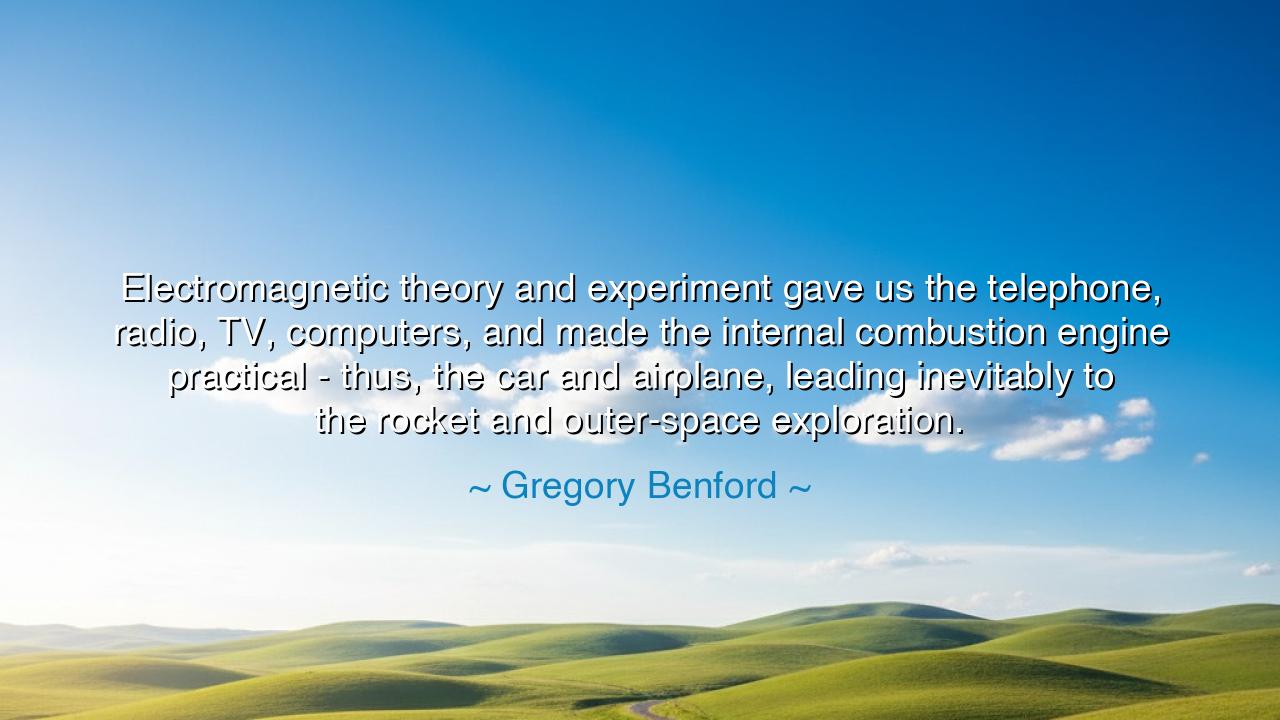
Electromagnetic theory and experiment gave us the telephone
Electromagnetic theory and experiment gave us the telephone, radio, TV, computers, and made the internal combustion engine practical - thus, the car and airplane, leading inevitably to the rocket and outer-space exploration.






“Electromagnetic theory and experiment gave us the telephone, radio, TV, computers, and made the internal combustion engine practical — thus, the car and airplane, leading inevitably to the rocket and outer-space exploration.” — in these words, Gregory Benford, the physicist and visionary author, traces the lineage of humanity’s most astonishing achievements back to their common ancestor: the discovery of electromagnetism, the invisible force that binds light, motion, and energy into a single law. His statement, though calm in tone, resonates with the awe of creation itself — for it is the story of how a single revelation about the nature of the universe transformed civilization, lifted mankind from earthbound dreams, and hurled it among the stars.
Benford speaks as one who sees not just science, but continuity — the unbroken chain of curiosity that stretches from the flickering experiments of the 19th century to the roaring engines of modernity. James Clerk Maxwell, the Scottish physicist whose equations unified electricity and magnetism, could scarcely have imagined that his abstract mathematics would one day give birth to telecommunication, flight, and space travel. Yet that is the nature of truth discovered: it ripples outward through time, shaping destinies. From his equations came the understanding that light itself is an electromagnetic wave — and from that understanding came radio, the voice that conquered silence; television, the window that bridged distance; and computers, the engines of thought that now weave the fabric of human life.
The journey that Benford describes is the odyssey of human ingenuity itself — a testament to the power of imagination guided by reason. From Maxwell to Faraday, from Edison to Tesla, from the Wright brothers to Goddard, each step was a stone laid upon the same path: the belief that nature’s secrets, once revealed, could uplift humanity beyond the limits of its birth. The internal combustion engine, too, owes its refinement to the principles of thermodynamics and electromagnetism — transforming fire and metal into motion, motion into travel, and travel into freedom. From these engines came the car, the airplane, and at last the rocket, humanity’s modern chariot of flame.
To understand the scope of Benford’s insight, consider the life of Michael Faraday, a humble bookbinder’s apprentice who, through relentless curiosity, uncovered the interplay between electricity and magnetism. His experiments, done with crude coils of wire and iron, became the foundation of every machine that hums and glows in our age. Yet Faraday sought no wealth, no fame — only understanding. When asked by a politician what practical use electricity could have, he replied, “One day, sir, you may tax it.” Thus began the empire of light that still grows today. It is this quiet devotion to discovery for its own sake that Benford celebrates — the pure fire of inquiry that ignites revolutions across centuries.
Benford’s phrase “leading inevitably to the rocket and outer-space exploration” is not mere prophecy but the fulfillment of an ancient longing. For millennia, humanity gazed at the stars with reverence and despair — knowing they were beyond reach. Yet through the patient accumulation of knowledge, through the humble experiment repeated a thousand times, the dream of flight became the destiny of ascent. The same laws that guided the flow of current in a copper wire became the laws that guided ships beyond the sky. What was once myth became method; what was once divine became human.
But his words carry a warning as well. For in the chain of progress lies a question of purpose. Each invention, each discovery, expands our power — but power without wisdom can destroy as easily as it creates. The same electromagnetic mastery that gives us communication also gives us weapons of immense destruction. Benford, as both scientist and storyteller, understands this duality. He calls us not only to marvel at the brilliance of our inventions but to use them wisely, to remember that every great leap forward must be guided by conscience as well as curiosity.
The lesson, then, is profound and enduring: honor the union of knowledge and wonder. Every discovery, no matter how small, carries within it the seed of transformation. From the hum of a coil in Faraday’s lab came the voices of nations and the roar of rockets. What, then, might arise from the experiments of today — from the fusion of artificial intelligence, quantum physics, and human imagination? The future is born not from miracles, but from understanding.
So remember, O seeker of truth — the path to the stars begins in the mind that dares to question the ordinary. Cherish the laws of nature, for they are the poetry of creation written in the language of mathematics. As Gregory Benford reminds us, every invention is not a separate triumph but a verse in the same eternal hymn — the song of humanity’s ascent from the spark of curiosity to the fire of the cosmos.






AAdministratorAdministrator
Welcome, honored guests. Please leave a comment, we will respond soon